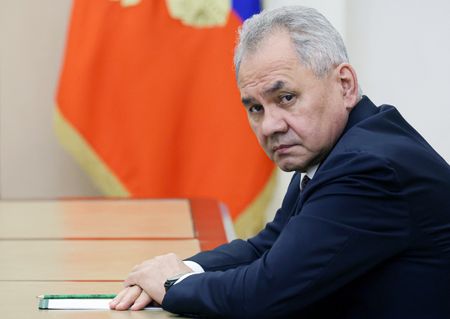By Guy Faulconbridge and Mark Trevelyan
MOSCOW (Reuters) -A senior ally of President Vladimir Putin arrived in Tehran on Monday for talks with Iranian leaders including the president and top security officials as the Islamic Republic weighs its response to the killing of a Hamas leader.
Russia has condemned the killing of Ismail Haniyeh, leader of the Palestinian Islamist group Hamas, in Iran last week and called on all parties to refrain from steps that could tip the Middle East into a wider regional war.
Sergei Shoigu, the secretary of Russia’s security council, was shown by Russia’s Zvezda television station meeting Rear Admiral Ali Akbar Ahmadian, a senior Islamic Revolutionary Guard Corps (IRGC) commander who serves as secretary of the Supreme National Security Council.
Shoigu, who was Russia’s defence minister before being moved to the security council in May, will also meet President Masoud Pezeshkian, Zvezda said.
“In Tehran, the secretary of the Russian Security Council is scheduled to meet with the president, the secretary of the Supreme National Security Council and the head of the General Staff,” according to Zvezda TV.
Though Putin has yet to comment in public on the recent escalation of tensions in the Middle East, senior Russian officials have said that those behind the killing of Haniyeh were seeking to scuttle any hope of peace in the Middle East and to draw the U.S. into military action.
Iran has blamed Israel and said it will “punish” it; Israeli officials have not claimed responsibility. Iran backs Hamas, which is at war with Israel in Gaza, and also the Lebanese group Hezbollah whose senior military commander Fuad Shukr was killed in an Israeli strike on Beirut last week.
Russia has cultivated closer ties with Iran since the start of its war with Ukraine and has said it is preparing to sign a wide-ranging cooperation agreement with the Islamic State.
Reuters reported in February that Iran had provided Russia with a large number of powerful surface-to-surface ballistic missiles. The U.S. said in June that Russia appeared to be deepening its defence cooperation with Iran and had received hundreds of one-way attack drones that it was using to strike Ukraine, something Moscow denies.
Russia said last Friday it joined Iran in condemning the assassination of the Hamas leader and pointing out “the extremely dangerous consequences of such actions”.
Washington said it did not have any expectation that Russia would play a productive role in de-escalating tensions in the region.
“We haven’t seen them play a productive role in this conflict since Oct. 7. They have, for the most part, been absent. Certainly we’ve seen them do nothing to urge any party to take de-escalatory steps,” U.S. State Department spokesperson Matthew Miller told a daily briefing.
The U.S. did not know why exactly Shoigu’s trip took place now, Miller said, but said one possibility might have been to further Moscow’s relationship with Tehran to seek support for its invasion of Ukraine.
“Certainly we have seen that with the security relationship between Iran and Russia before,” he added.
(Additional reporting by Simon Lewis and Humeyra Pamuk Writing by Guy Faulconbridge, editing by Mark Trevelyan and David Gregorio)












